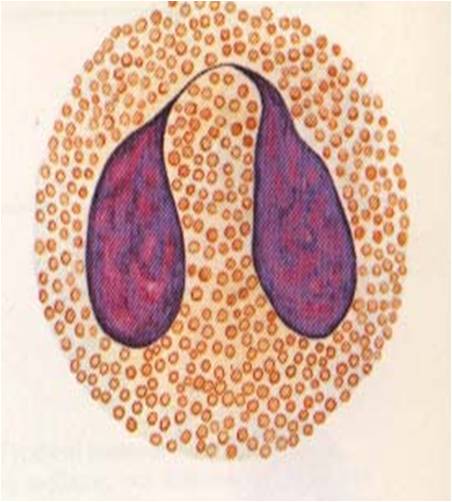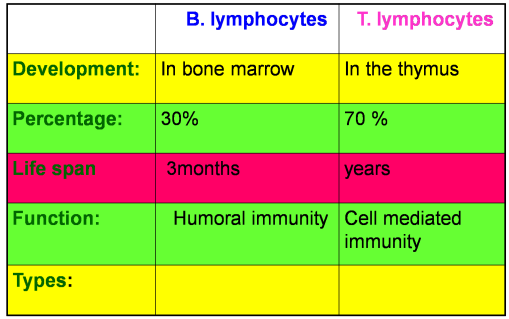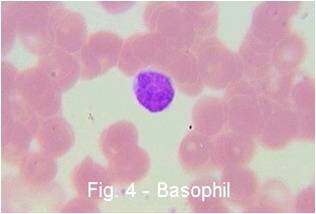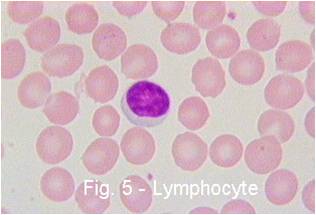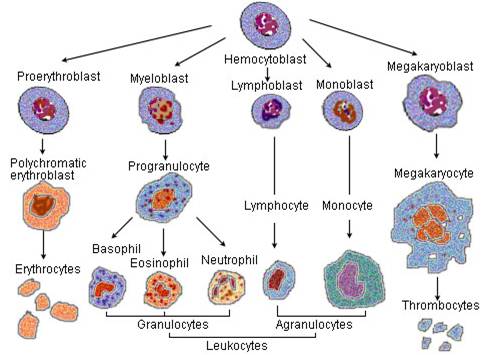L1 – Histology of Blood Cells
THE BLOOD
•Definition:-
It is the viscid fluid, present in the closed circulatory system
•Contents:
1-blood cells:
•They form about 45% of the blood volume.
•The Blood cells are:-
a- Red cells (erythrocytes).
b- White cells (leukocytes).
c- Blood platelets (thrombocytes).
2-Plasma:
•it forms 55% of the blood volume
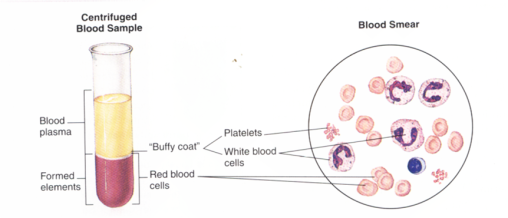
BLOOD CELLS
(1) RED BLOOD CORPUSCLES (RBCS) / Erythrocytes
A- Shape of RBCs:-
•They are biconcave disc shape.
•In slow blood stream and in blood film they adhere together forming “Rouleaux” due to high surface tension.
B- Size:-
•Normal diameter: 6-9 um (average 7.5 um).

C- Colour:-
•Fresh, single RBC is greenish yellow due to minimal HB.
•A drop of blood appears red as it contains large number of RBCs.
•In stained sections, RBCs with normal HB appear acidophilic with pale centre (normochromic).
D- Number:-
•In males: 5 – 5.5 million /mm3.
•In females: 4.5 – 5 million /mm3.(due to loss of blood during menstruation and depression of bone marrow by female sex hormones).
E- Structure of RBCs:-
•They are non nucleated cells (now called corpuscles).
•They have no organoids but filled with HB.
•They are surrounded by cell membrane, which is plastic and has selective permeability.
•They contain important enzymes e.g. carbonic anhydrase enzyme.
F- Adaptation of RBCs to its function:-
•Its biconcave shape increases surface area for more gas exchange. •Absence of nuclei and cell organoids allows more space to HB for gas exchange.
•Carbonic anhydrase enzyme plays an important role in transportation of CO2 from tissues to the lung.
•Selective permeability of the cell membrane allows easy exchange of oxygen and CO2 but not HB.
•Plastic cell membrane allows RBCs to be squeezed in narrow vessels, then regain its normal shape in wide vessels thus prevent their rupture.
(2) LEUCOCYTES (WBCS)
A- Definition:-
•They are true nucleated cells having cell organoids, cell inclusions, but no hemoglobin.
B- Colour:
•Single WBC is colourless (leucocyte) but when aggregated, they appear white (WBCs).
C- Number:
4000-11000/mm3
D- Classification of leucocytes:
1-Granular leucocytes:-
a- Neutrophils.
b- Eosinophils.
c- Basophils.
2- Non-granular leucocytes :-
a- Lymphocytes.
b- Monocytes.
Neutrophils (polymorphonuclear leucocytes)
A- Percentage:60-75% of total leucocytes.
B- Shape:spherical
C- Size: 10-12 um.
D- Nucleus:-
•Single, dark stained and segmented (2-5 segments connected by fine chromatin threads.
•About 60% of female nuetrophils have Barr bodies attached to their nuclei.
E- Cytoplasm:-
•contains fine neutrophilic granules.
F- E/M:
•Few mitochondria
• endoplasmic reticulum.
•Two types of granules are present:-
- Specific granules:
- •Numerous & small in size.
- •Contain bacteriostatic and bactericidal substances.
- Azurophilic granules:
- •Few in number & large in size.
- •Contain hydrolytic enzymes (lysosomes).
G- Life span: 1- 4 days.
H- Functions:-
•Defense against microorganisms.
•When microorganism invades the surrounding tissue, the neutrophils migrate from the capillaries and phagocytose it (so called microphages).
•They also secrete proteolytic enzymes.
•During infections, they stimulate the bone marrow to produce more leucocytes (neutrophilia).
•They attract monocytes to the infected area.
•Precipitate in pus formation.
•They secrete trephone substances, that help in healing of wounds.

Eosinophils
A- Percentage: 2- 5% of total leucocytes.
B- Shape: spherical
C- Size: 12-15 um.
D- Nucleus: Bilobed “horse shoe-shaped”.
E-Cytoplasm: contains acidophilic refractile granules.
F-E/M :-
•Few mitochondria, rER, and Golgi.
•Coarse ellipsoid granules, with electron dense crystalloid core in the centre.
•These granules contain histaminase and sulphatase enzyme.
G- Life Span: 8-12 days.
H-Functions:-
1-In allergic conditions, the mast cells attract eosinophils to the site of allergy to perform anti-allergic action
2-They can phagocytose the antigen-antibody complex.
3-They secrete histaminase and sulphatase enzymes which destroy histamine and sulphate substances of allergy.
Basophils
A- Percentage: ½ – 1 % of total leucocytes.
B- Shape: spherical
C- Size: 10 – 12 um.
D- Nucleus: Large and irregular.
E- Cytopasm:-
•Filled with large basophilic granules.
•These granules can be stained metachromatic .
•They also stained with Giemsa stain.
F- E/M :-
•They contain coarse electron dense granules.
•These granules contain histamine and heparin.
G- Life Span: 10-15 days.
H- Functions:-
•They produce heparin and histamine during allergy.
•They have minimal phagocytic activity.
•They release eosinophil chemotactic factor.
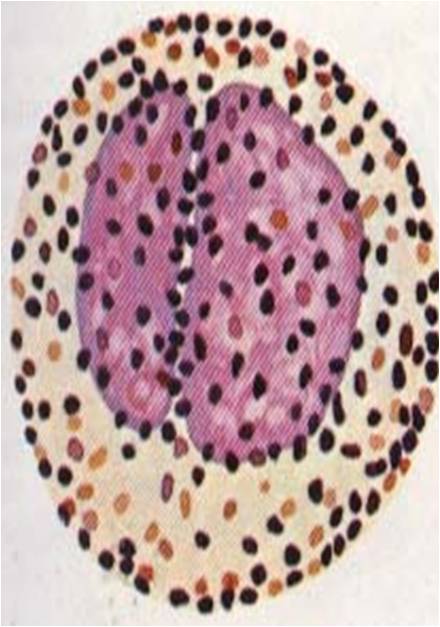
Lymphocytes
•Non granular leucocytes
Percentage: 25-30%.
Classification :
1-Small sized lymphocytes: 4-7 um.
2-Medium sized lymphocytes: 7-10 um.
3-Large sized lymphocytes: 10-15 um.
•Lymphocytes found in the blood are mainly small and medium sized, while the lymphoid organs contain the three types.
Large or medium-sized lymphocytes
A- Percentage: 5-10%.
B- Size: 10 – 12 um
C- Nucleus: Large, pale and indented.
D- Cytoplasm: abundant, more basophilic and non granular.
E- E/M :-
•The cytoplasm contains polyribosomes, numerous mitochondria, large Golgi and lysosomes.
 Small Lymphocytes
Small Lymphocytes
A- Percentage: 15-20%.
B- Shape: spherical.
C- Size:6-8 um.
D- Nucleus:-
•Central, round and dark stained.
•Surrounded by a thin rim of cytoplasm.
E- Cytoplasm: few in amount & pale basophilic.
F- E/M:-
•They have few ribosomes, few mitochondria, a very small Golgi and few azurophilic granules.
G- Classification:-
- B. lymphocytes.
- T. lymphocytes .
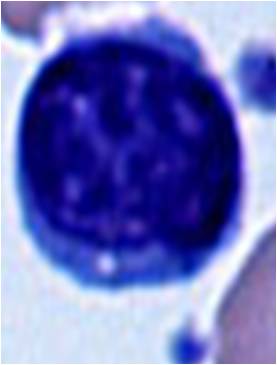 B- lymphocytes
B- lymphocytes
•Development:
-U.M.C in the bone marrow colony forming cells … B. lymphoblast… B. lymphocyte.
•Percentage : 30% lymphcytes.
•Types :
- B.lymphocytes of humoral immunity.
- B.memory cells.
•Life span:3months
•Function :-
1– Humoral immunity:
•When exposed to antigen, they are activated into medium sized lymphocytes.
•Some of the active cells are differentiated into plasma cells which produce antibodies.
•This is called primary immune response. •
2- Secondary response (B memory cells):
•Some of the active cells are not changed into plasma cells but remain as memory cells.
•When exposed to the same antigen again, they produce more rapid and more extensive humoral immune response.
T. Lymphocytes
•Development:
-UMC in the bone marrow colony forming cells which migrate to the thymus gland where they develop into T.lymphocytes (thymus dependent).
•Percentage: 70 % of small lymphocytes
•Life span: years.
•Types:
- T. killer cells: produce cytotoxic substances.
- T. memory cells
- T. helper cells.
- T. suppressor cells.
- Lymphokines secreting cells.
•Function:-
- 1•Cell mediated immunity:-
•When exposed to cellular antigen, the T-lymphocytes are activated and come in contact with the antigen.
•They secrete cytotoxic substance to destroy it.
- 2•Graft rejection cells in organ transplantation:
(by cell mediated immunity).
- 3•T-memory cells:
•Some of the activated T-cells remain in the body as memory cells, that can attack the same antigen after a long period of time.
- 4•T-helper cells:-
•T-lymphocytes, can help the B-lymphocytes to be activated by the antigen.
- 5•Secretion of lymphokines:
•Interferon: antiviral.
•Colony stimulating factor: stimulate bone marrow cells.
•Macrophage factor: antibacterial.
- 6•They act as macrophage attracting cells .
Monocytes
A- Percentage: 3-8%.
B- Size: 15 um .
C- Nucleus: large, pale and kidney shaped.
D- Cytoplasm: abundant and appears pale blue.
E- E/M :-
•Many microvilli and pinocytotic vesicles near the cell surface.
•Few cell organelles, small Golgi and azurophilic granules (lysosomes).
F- Life Span: 3 Days
G- Function:-
•Monocytes can penetrate through capillaries and venules to reach the C.T. where they can be transformed into macrophages.
(3) PLATELETS (THROMBOCYTES)

A- Definition :
•They are fragments of cytoplasm covered with membrane but have no nucleus (not true cells).
B- Origin :
•Megakaryocytes in the red bone marrow.
C- Size:
•2 – 4 mm.
D- Shape :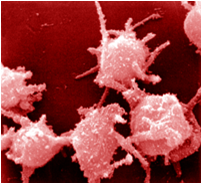
•oval or rounded discs.
E- Number:
•150.000 – 400.000 / mm3.
F- L / M :
•Appear as oval or rounded non nucleated discs.
•Their outer part appears transparent and pale blue (called hyalomere).
•Their central part contains dark stained granules (called granulomere).
G- E/M:-
1-Cell membrane:-
Irregular and covered with a thick cell coat.
2- Hyalomere:-contains
- Tubules & vesicles invaginated from the cell membrane.
- Actin-like mirofilaments and microtubules to maintain the ovoid shape of the platelet.
3- Granulomere: (chromomere):-contains
- Alpha granules: contain fibrinogen.
- Beta granules: mitochondria .
- Delta granules: contains serotonin, ATP, ADP and calcium.
- Lambda granules: lysosomes.
- Glycogen granules.
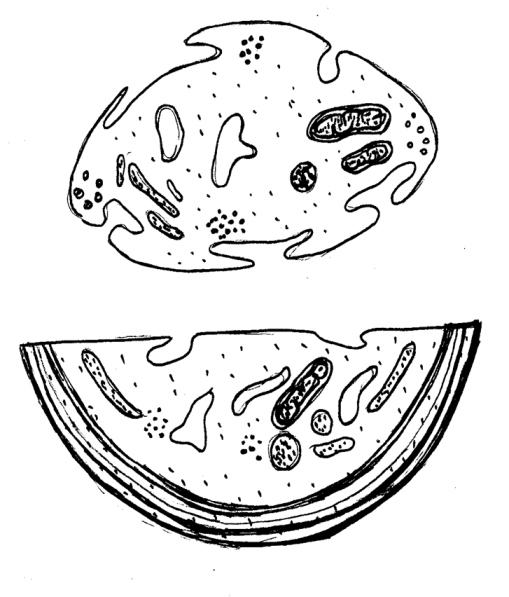 H- Life span:
H- Life span:
•5-10 days
I- Function :-
•Stop bleeding (haemostasis) through :
1-Secretion of serotonin → vasconstriction → decrease blood loss.
2-The platelets adhere to the inner wall of the injured blood vessels forming platelet aggregation or white thrombus.
3-Then, they secrete thromboblastin → change prothrombin into thrombin → change fibrinogen into fibrin network → attract RBCs to form red thrombus (coagulation) which close blood vessels and stop bleeding.
 RBC
RBC
 NEUTROPHILS
NEUTROPHILS
Anomalies in Blood Cells Values

RBC
1- Anaemia or oligocythemia
• Decease in number is caused by:-
- Deficiency of iron, vit.B12, proteins, copper.
- Defect in bone marrow → aplastic anaemia.
- Haemorrhage → haemorrhagic anaemia .
- Haemolysis → haemolytic anaemia.
•Causes of haemolysis are :-
- Incompatible blood transfusion.
- Acids and alkalies.
- Bacterial toxins and viruses.
- Snake venom.
- Hypotonic solutions and fat solvents.
2- Polycythaemia
a- Haemoconcentration:
•The actual number of RBCs does not increase but the volume of plasma is reduced.
•Occurs in cases of dehydration due to vomiting, diarrhea or polyuria.
b- Compensatory polycythaemia :
•There is actual increase in production of RBCs from bone marrow.
•Occurs as compensatory to hypoxia as in:-
- The foetus due to intrauterine anoxia.
- High attitude in low O2.
- Severe muscular exercise →need for O2.
- Congenital heart diseases→ mixed blood.
- Chronic lung conditions → impaired oxygenation of blood
Neutrophils
1- Neutropenia:
•It is a decrease of neutrophils below 60%.
•It occurs in:
- Influenza
- measles
- starvation
- severe poisoning
- chronic infections eg. Typhoid & TB.
2- Neutrophilia:
•It is an increase of neutrophils above 75%.
•It occurs in:
- Pyogenic infections: e.g. tonsilitis, appendicitis
- Myocardial infarction.
Eosinophils
1- Eosinophilia:
-Allergic diseases.
-Parasitic infections e.g. bilharziasis.
2- Eosinopenia :
-It occurs after:-
- Prolonged steroid therapy.
Basophils
1- Basophilia
-Allergic diseases.
-Parasitic diseases.
-Liver cirrhosis.
Lymphocytes
1- Lymphocytosis:
•Whooping cough.
•TB.
•Syphilis.
•Glandular fever
Monocytes
1- Monocytosis:
•Malaria.
•Typhus.
•TB.
•Syphilis.
•Glandular fever.

